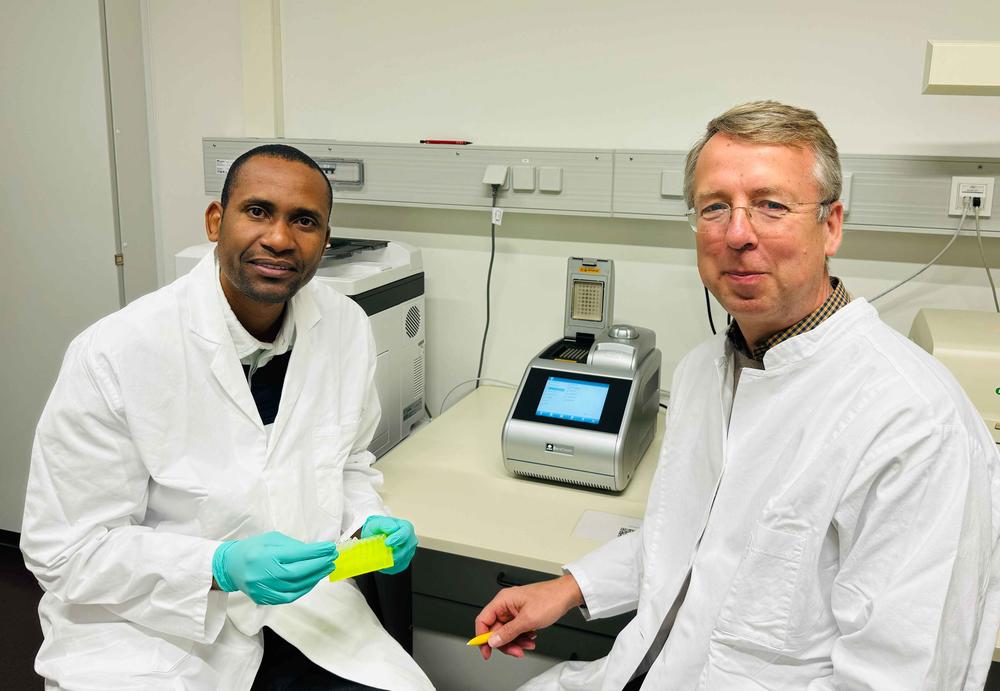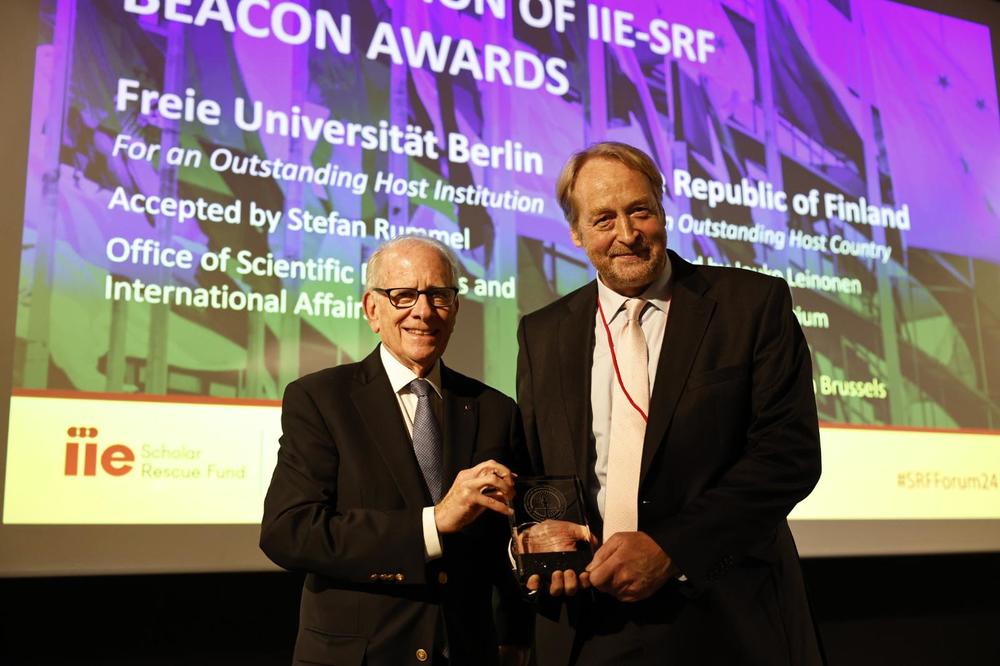When Researchers Are Forced to Flee Their Countries
The Sudanese veterinarian Khalid Mohammedsalih from Nyala University in Sudan is conducting research at Freie Universität Berlin as a fellow of the Scholar Rescue Fund
Dec 17, 2024
Partners in research: Veterinarian Dr. Khalid Mohammedsalih (l.) and Prof. Dr. Georg von Samson-Himmelstjerna
Image Credit: personal collection
Grazing animals are exposed to many diseases and parasites in their lives. Among these are various worms which often implant themselves in the gastrointestinal tract. There they cause problems that can lead to the death of the animals. An important part of animal husbandry involves treating livestock with deworming medication.
However, this leads to the problem that increasing numbers of parasites develop resistance to such products. “Treatment with the usual medicines is becoming less and less effective,” says Khalid Mohammedsalih. “Increasingly, animals cannot be treated effectively and die.”
The veterinarian observes closely the impacts of this problem in his home country, Sudan. “I work in a veterinary pharmacy where farmers complain to me every day that the worming pills no longer work,” he reports. “This is catastrophic in a country where a large part of the population subsists on pasture farming.”
This is how Khalid Mohammedsalih became an expert in this field. He started to write his dissertation on the topic and gathered data in the region as the first researcher in the world to do so. He then became an associate professor at Nyala University in southwestern Sudan. Money from international donors enabled him to build a modern biological laboratory there.
Academic Career Interrupted
In April 2023, the Sudanese civil war broke out. “This began a very tough time for my family and me, for all people in Sudan,” says Mohammedsalih. “My laboratory was completely destroyed, and my family and I had to flee for our lives several times, at first within Sudan, and eventually out of the country.”
Since December 2023, Mohammedsalih has continued his research at the Institute of Parasitology and Tropical Veterinary Medicine at Freie Universität Berlin. He is analyzing the data that he had collected before the war broke out and preparing it for publication. His work is sponsored by the Scholar Rescue Fund. The fellowship granted by the US Institute of International Education (IIE) supports global researchers who are politically threatened and/or displaced from their home countries.
Freie Universität Berlin has participated in the program as a host university for the past ten years. The first SRF fellow in January 2014 was an Iranian Koran scholar. Since then, five researchers have been supported by an SRF fellowship at Freie Universität, from Syria, Sudan, Venezuela, Yemen, and Iran. They receive a fellowship for one or two years that covers all of their living expenses. The IIE and the host institution each cover half of the costs.
Stefan Rummel, head of Freie Universität’s Academic Relations Unit, accepts the Beacon Award on behalf of the university at an event in Brussels.
Image Credit: personal collection
“Protecting academic freedom is one of the core values of Freie Universität,” says Stefan Rummel. “We are glad to serve as hosts, and value highly the establishment of the Scholar Rescue Fund and the people that come to us through it.”
Rummel leads Freie Universität’s Academic Relations Unit in the Division of International Affairs and is responsible for the university’s SRF program. He recently traveled to Brussels, where on October 10, Freie Universität Berlin received the Beacon Award from the Institute of International Education as an outstanding host institution of the Scholar Rescue Fund.
“This prize is a great honor for us,” says Florian Kohstall, who is in charge of the Global Responsibility project at Freie Universität Berlin. In the past few years, Freie Universität has served as a temporary institutional home to over sixty researchers at risk. This service was made possible in part by contributions from various foundations, including the Philipp Schwartz Initiative of the Humboldt Foundation, and the Einstein Foundation Berlin. “It is quite satisfying to be recognized in this way for the efforts that we have invested in this cooperation over the years.”
Rummel emphasizes that participation in the SRF program benefits everyone involved. “Humanitarian reasons are decisive for candidate selection,” he states. “At the same time, we take care to ensure that the fellowship holders and their research are also a good fit with Freie Universität. Our goal is ultimately for the fellowship recipient and supervisor to build a partnership that is sustainable on both sides.”
Before Khalid Mohammedsalih received support from the Scholar Rescue Fund, he had already been a visiting researcher involved in several research projects. He has a longstanding working relationship with his research partner, Georg von Samson-Himmelstjerna, professor and director of the Institute for Parasitology and Tropical Veterinary Medicine at Freie Universität Berlin. He also has close ties to Jürgen Krücken, research associate and permanent lecturer at the same institute.
“After all, we are an institute specifically for tropical veterinary medicine,” says Georg von Samson-Himmelstjerna. “With his knowledge, experience, and data from Sudan, Khalid Mohammedsalih makes a highly valuable contribution to our institute.”
As soon as there is political stability in Sudan, Khalid Mohammedsalih would like to use his research work to support agriculture in his home country. “We now have the data that proves that farmers are correct in their assessment,” he says. “The medications do not in fact work as they did before, and there is a risk of serious consequences if we do not reverse this trend. We need further research and political measures to stop such a development.”
This article originally appeared in German in the Tagesspiegel newspaper supplement published by Freie Universität Berlin.
Further Information
This is how Freie Universität Berlin supports threatened and exiled researchers and scholars:
- Freie Universität Berlin has been a member of the network Scholars at Risk since 2012: This network nominates threatened or persecuted researchers and scholars. When there is a researcher at Freie Universität Berlin who would be a good match for the work of one of these scholars, the university supports that person in their application for potential fellowships. Along with the support from the Scholar Rescue Fund described here, additional aid is available through the Philipp Schwartz Initiative of the Humboldt Foundation or the new EU-DAAD program Safe. Freie Universität Berlin currently supports twelve individuals in this context.
- Language courses for refugee students preparing to continue their studies (supported by the Berlin Senate).
- Freie Universität Berlin nominates students living under threat in their home countries for the German Academic Exchange Service (DAAD)’s Hilde Domin Program, a program that can be used to help students complete a bachelor’s, master’s, or doctoral program at Freie Universität Berlin.


